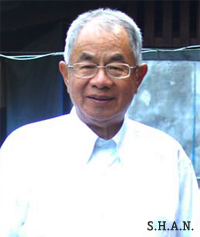Sources within Burma’s Shan State have speculated that the October 12th release of former Shan State Army (SSA) leader General Hso Ten has been used as leverage by Burmese government officials as part of their ongoing effort to entice armed resistance groups into peace talks and negotiations. It is believed that the government’s release of Hso Ten was included in previous discussions as an incentive to schedule future meetings in an ongoing negotiation process with the SSA.

Sources close to SSA officials have indicated that the two sides met in Taunggyi, Eastern Shan State prior to Hso Ten’s release, with additional talks between the SSA and Burma Army now forthcoming and imminent. Upon Hso Ten’s release on the 12th, it is reported that the General met immediately with Burma Army officials in Rangoon.
No specific details have surfaced about the October 12th discussion, though it is believed that the discussions were about military matters involving the SSA. Sources have indicated that after his release, Hso Ten was followed by the Burmese Army officials back to Lashio in Shan State North. General Hso Ten has thus far refused interviews and made no comments to members of the media since his release, citing unfamiliarity with making public statements through media. “He has declined to talk to the media,” his close relative regretted.
Suspicion in the Shan State about Hso Ten’s release (which was portrayed as unrelated to the current dialogue between government officials and the SSA) has led many to wonder why other Shan political figures were not released. Six prominent Shan leaders, both military and otherwise, remain imprisoned. Among them is Hkun Htun Oo, Chairman of the defunct Shan Nationalities League for Democracy (SNLD), the second largest winning party in the 1990 elections. “Release of Hkun Tun Oo, as an elected representative of the people, would greatly contribute to the peace process,” said Harn Yawnghwe, director of the Euro Burma Office based in Brussels and the youngest son of the late Sao Shwe Thaike, Prince of Yawnghwe, Shan State, and the first president of Independent Burma (1948-1954).



